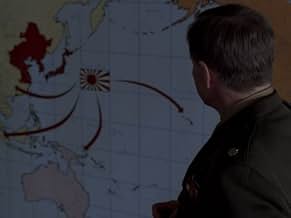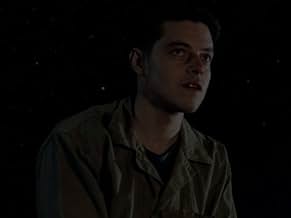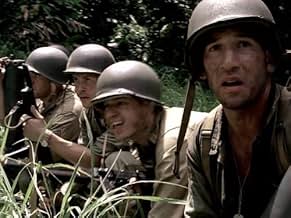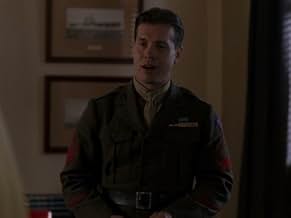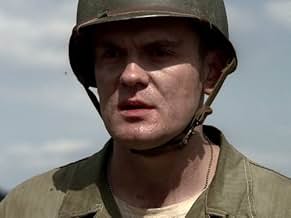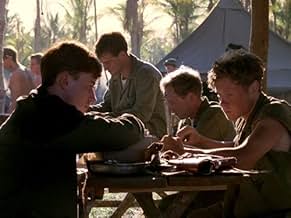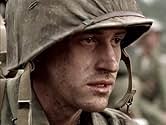The Pacific Theatre of World War II, as seen through the eyes of several young Marines.The Pacific Theatre of World War II, as seen through the eyes of several young Marines.The Pacific Theatre of World War II, as seen through the eyes of several young Marines.
- Won 8 Primetime Emmys
- 36 wins & 44 nominations total
Browse episodes
Featured reviews
10follis12
The war in the Pacific was a hell of a lot different than the war in Europe. Of course both where terrible - full of death, sacrifice, and heroism. However, it seems the soldier's stories from the European theater have gotten a lot more press.
The US Marines in the Pacific lived like animals in the most horrible environments imaginable. On top of fighting an enemy committed to kill them at all cost and never surrender, they battled the mud, heat, malaria, near starvation, and isolation for months on end.
Basically, it was a total nightmare, and the heroism of all the US Marines in the Pacific theater is nothing short of awe inspiring. The Pacific tells this story well. It is a must see on the topic of WW2.
The US Marines in the Pacific lived like animals in the most horrible environments imaginable. On top of fighting an enemy committed to kill them at all cost and never surrender, they battled the mud, heat, malaria, near starvation, and isolation for months on end.
Basically, it was a total nightmare, and the heroism of all the US Marines in the Pacific theater is nothing short of awe inspiring. The Pacific tells this story well. It is a must see on the topic of WW2.
I'm Australian and it's ANZAC day today where the whole country honours all those who have served our country and others in all theatres of war. I judge The Pacific as a dramatic representation of the war in the Pacific, not a 100% historically accurate documentary.
I'm so glad The Pacific is on, because it highlights part of the war that was so vital to my country. I might not be Australian today if our allied forces hadn't won the battles. Maybe because I grew up with a significant focus on the impacts of the war with the Japanese, I get a lot from the show and when I watch it I feel how awful it was for the marines and all who were there, and how Australia was the closest safe haven for those men and women. Just seeing a brief mention of the starvation, tropical ulcers, how important it was to stop the Japanese airstrip on Guadalcanal, the Japanese mentality, is enough for me to get a lot out of the show. I already know how long it went on for, and that the battles were many and varied.
Think the Burma railway, Changi, Kokoda, and I realise the enormity of what these people went through, they were skeletons in rags if they manged to survive and come out of there. The Japanese bombed Darwin, there were submarines in Sydney Harbour, and just last year, we finally discovered the wreck of a hospital ship that he Japanese torpedoed and sank, just off Brisbane. The college I attended was turned into a US army hospital base in WWII and has miles of underground tunnels. MacArthur's base in Brisbane is still named after him, it's now a shopping centre, MacArthur Central. The anniversary of the battle of the Coral Sea a few years ago in Townsville was huge.
The Pacific is a great show for me. I like it, I appreciate what they're representing in the short time they have to do it in a TV show. Just a quick look at someone who says goodbye to family in a snowy climate and then lands on a tropical island speaks volumes about what they faced to me. If it brings even a small amount of appreciation to others who are not as familiar with this part of WWII, The Pacific has done a great job. I give it a thumbs up.
For another interesting story set around this time, check out the movie Paradise Road.
I'm so glad The Pacific is on, because it highlights part of the war that was so vital to my country. I might not be Australian today if our allied forces hadn't won the battles. Maybe because I grew up with a significant focus on the impacts of the war with the Japanese, I get a lot from the show and when I watch it I feel how awful it was for the marines and all who were there, and how Australia was the closest safe haven for those men and women. Just seeing a brief mention of the starvation, tropical ulcers, how important it was to stop the Japanese airstrip on Guadalcanal, the Japanese mentality, is enough for me to get a lot out of the show. I already know how long it went on for, and that the battles were many and varied.
Think the Burma railway, Changi, Kokoda, and I realise the enormity of what these people went through, they were skeletons in rags if they manged to survive and come out of there. The Japanese bombed Darwin, there were submarines in Sydney Harbour, and just last year, we finally discovered the wreck of a hospital ship that he Japanese torpedoed and sank, just off Brisbane. The college I attended was turned into a US army hospital base in WWII and has miles of underground tunnels. MacArthur's base in Brisbane is still named after him, it's now a shopping centre, MacArthur Central. The anniversary of the battle of the Coral Sea a few years ago in Townsville was huge.
The Pacific is a great show for me. I like it, I appreciate what they're representing in the short time they have to do it in a TV show. Just a quick look at someone who says goodbye to family in a snowy climate and then lands on a tropical island speaks volumes about what they faced to me. If it brings even a small amount of appreciation to others who are not as familiar with this part of WWII, The Pacific has done a great job. I give it a thumbs up.
For another interesting story set around this time, check out the movie Paradise Road.
I enjoyed this series very much and can see why there has been so many comparisons with Band Of Brothers. My observation is that in The Pacific many of the characters lack depth and development. The result was that I cared less when ill befell them than I did in Band of Brothers. I think that the first episode could have contained a lot more time letting us get to know the characters better before throwing them into battle.
The battle scenes were done very well and played very realistically. All in all HBO has done it again. Without the HBO and Showtime I think that US grown TV drama would be pretty thin on the ground. The Pacific is well worth the time.
The battle scenes were done very well and played very realistically. All in all HBO has done it again. Without the HBO and Showtime I think that US grown TV drama would be pretty thin on the ground. The Pacific is well worth the time.
The Pacific... every time I come across this series I always want to watch it again. The show really shows you what the soldiers that fought in WW2 felt and went through. It's series like this that keep the memory of those brave soldiers who fought for their country alive. And also, the opening theme is... Just hear it for yourself.
I'm guessing most of us watched 'The Pacific' for at least one of the following 3 reasons:
1. We have an interest in history, particularly in WW2.
2. We are fans of movies and television shows (well, the good ones anyway)
3. We had seen - and loved - the previous Hanks/Spielberg co-production 'Band Of Brothers' and expected a mini-series on the same level.
Now from reading some of the reviews here I gather that third reason was the most important one for many viewers - and it's also why 'The Pacific' apparently left quite a few people disappointed. As for me, I wasn't disappointed - I was devastated.
I'm a lucky man; I've never had to suffer through a war. But I had relatives who did, and though they're all long gone now, I'll never forget their stories. War is the most extreme and outrageous experience humans can possibly endure, but there are many different aspects and layers to it, because a war is not a single experience: it's all the experiences of all the individuals who have to suffer through it, and no single film or TV show can cover all of them. 'Band Of Brothers' focused on certain aspects of a war, and it chose a narrative that helped emphasize what the core theme of the series was: the brotherhood of war. It was about people who retain their humanity and form the closest of bonds under the worst, most horrific circumstances.
That inherently human element in 'BoB' was also why we could identify so well with the protagonists, and why we were - and still are - so deeply touched by what they had to go through. It's an outstandingly well made series, and I can't imagine how those experiences by those soldiers could have been portrayed better. Which is why 'The Pacific' doesn't even try. Instead, it goes almost in the opposite direction by choosing to focus on the sheer insanity of war: the relentless horror and despair of people losing their humanity and their struggle to regain it. Of course, just like 'BoB' it's also about the heroic sacrifices of those brave soldiers, but if there is a core theme in 'The Pacific' it's that of trauma: the trauma of having your humanity stripped from you and your personality shattered; the trauma of witnessing the complete disintegration of everything you thought you were and knowing you'll never be whole again.
What we see in 'The Pacific' is Hell, plain and simple. It's scores and scores of anonymous, young Japanese soldiers running senselessly into machine gun fire, wave after wave, until the piles of their bodies are so high they block the sight for the machine gun; it's American soldiers barely older than kids in despair or completely numb from the sheer amount of random death around them; it's vibrant young men turning into barely alive husks whose only remaining focus is to survive - which means they have to kill other barely alive young men who will stop at nothing to kill them in turn; it's kids killing other kids like rats by any means at their disposal: guns, knives, flame-throwers or with their bare hands; it's people living among the rotting corpses of their dead comrades and enemies and completely losing any regard for human life. And the few moments where we witness how those kids get a brief taste of how precious and beautiful life could be make their fate all the more heartbreaking.
Over large stretches, 'The Pacific' is devastating and depressing to watch, and though I found it never less than compelling, it's actually easy to see why many viewers who had hoped for a similarly engaging experience as in 'BoB' were left disappointed. But this is a different story about different people who fought in a different theater of the war and who went through different experiences, and once you stop comparing it to the story of the men in Easy Company from 'BoB', you'll find that, while different, in terms of sheer quality 'The Pacific' is every bit as good and as much of an outstanding achievement as its more popular predecessor.
The realism, the performances, the music and the production values in the series are superb (this was a 200 million production after all), and the attention to historic detail is simply staggering. As for me, witnessing what these men went through left me devastated; yet I am grateful I've watched 'The Pacifc': because in its relentless depiction of the horrors of war it honors the sacrifice these brave young soldiers made in the hope future generations wouldn't have to do the same. I originally rated this series 9 stars out of 10, but upon a recent rewatch and with more knowledge of the war in the Pacific theater, it's clear that this is a 10/10. Outstanding.
Favorite films: IMDb.com/list/mkjOKvqlSBs/
Lesser-Known Masterpieces: imdb.com/list/ls070242495/
Favorite TV-Shows reviewed: imdb.com/list/ls075552387/
1. We have an interest in history, particularly in WW2.
2. We are fans of movies and television shows (well, the good ones anyway)
3. We had seen - and loved - the previous Hanks/Spielberg co-production 'Band Of Brothers' and expected a mini-series on the same level.
Now from reading some of the reviews here I gather that third reason was the most important one for many viewers - and it's also why 'The Pacific' apparently left quite a few people disappointed. As for me, I wasn't disappointed - I was devastated.
I'm a lucky man; I've never had to suffer through a war. But I had relatives who did, and though they're all long gone now, I'll never forget their stories. War is the most extreme and outrageous experience humans can possibly endure, but there are many different aspects and layers to it, because a war is not a single experience: it's all the experiences of all the individuals who have to suffer through it, and no single film or TV show can cover all of them. 'Band Of Brothers' focused on certain aspects of a war, and it chose a narrative that helped emphasize what the core theme of the series was: the brotherhood of war. It was about people who retain their humanity and form the closest of bonds under the worst, most horrific circumstances.
That inherently human element in 'BoB' was also why we could identify so well with the protagonists, and why we were - and still are - so deeply touched by what they had to go through. It's an outstandingly well made series, and I can't imagine how those experiences by those soldiers could have been portrayed better. Which is why 'The Pacific' doesn't even try. Instead, it goes almost in the opposite direction by choosing to focus on the sheer insanity of war: the relentless horror and despair of people losing their humanity and their struggle to regain it. Of course, just like 'BoB' it's also about the heroic sacrifices of those brave soldiers, but if there is a core theme in 'The Pacific' it's that of trauma: the trauma of having your humanity stripped from you and your personality shattered; the trauma of witnessing the complete disintegration of everything you thought you were and knowing you'll never be whole again.
What we see in 'The Pacific' is Hell, plain and simple. It's scores and scores of anonymous, young Japanese soldiers running senselessly into machine gun fire, wave after wave, until the piles of their bodies are so high they block the sight for the machine gun; it's American soldiers barely older than kids in despair or completely numb from the sheer amount of random death around them; it's vibrant young men turning into barely alive husks whose only remaining focus is to survive - which means they have to kill other barely alive young men who will stop at nothing to kill them in turn; it's kids killing other kids like rats by any means at their disposal: guns, knives, flame-throwers or with their bare hands; it's people living among the rotting corpses of their dead comrades and enemies and completely losing any regard for human life. And the few moments where we witness how those kids get a brief taste of how precious and beautiful life could be make their fate all the more heartbreaking.
Over large stretches, 'The Pacific' is devastating and depressing to watch, and though I found it never less than compelling, it's actually easy to see why many viewers who had hoped for a similarly engaging experience as in 'BoB' were left disappointed. But this is a different story about different people who fought in a different theater of the war and who went through different experiences, and once you stop comparing it to the story of the men in Easy Company from 'BoB', you'll find that, while different, in terms of sheer quality 'The Pacific' is every bit as good and as much of an outstanding achievement as its more popular predecessor.
The realism, the performances, the music and the production values in the series are superb (this was a 200 million production after all), and the attention to historic detail is simply staggering. As for me, witnessing what these men went through left me devastated; yet I am grateful I've watched 'The Pacifc': because in its relentless depiction of the horrors of war it honors the sacrifice these brave young soldiers made in the hope future generations wouldn't have to do the same. I originally rated this series 9 stars out of 10, but upon a recent rewatch and with more knowledge of the war in the Pacific theater, it's clear that this is a 10/10. Outstanding.
Favorite films: IMDb.com/list/mkjOKvqlSBs/
Lesser-Known Masterpieces: imdb.com/list/ls070242495/
Favorite TV-Shows reviewed: imdb.com/list/ls075552387/
Did you know
- TriviaDuring his audition, Rami Malek (Snafu) noticed that the man running the camera was not, as is typical, a young assistant, but an older gentleman who was doing some "very elegant camera work." Midway through his scene, he realized that the camera operator was actually Steven Spielberg.
- GoofsAt about 1:20 into the opening credits, a Navy ship sails into view from the left. On the bow is a small vertical mast (the jackstaff) flying a small flag (the Jack). The Jack and jackstaff are only used when the ship is anchored or moored never when it is underway.
- ConnectionsFeatured in The 62nd Primetime Emmy Awards (2010)
- How many seasons does The Pacific have?Powered by Alexa
Details
- Release date
- Countries of origin
- Official site
- Languages
- Also known as
- The Pacific
- Filming locations
- Production companies
- See more company credits at IMDbPro
- Runtime
- 1h(60 min)
- Color
- Sound mix
- Aspect ratio
- 1.78 : 1
Contribute to this page
Suggest an edit or add missing content





